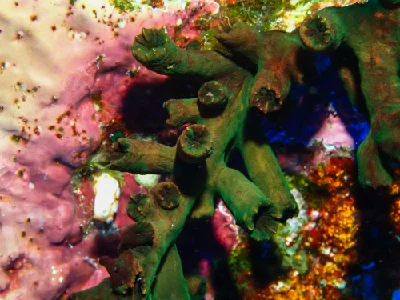Scleractinia
Scleractinia, commonly referred to as stony corals or hard corals, are marine organisms found in the phylum Cnidaria that possess the remarkable ability to construct a rigid external skeleton. Highly organized, these animals exist as polyps, with a cylindrical body structure topped by an oral disc featuring a mouth surrounded by tentacles. Although certain species exhibit solitary behavior, the majority exist as colonies. The founding polyp settles and commences the secretion of calcium carbonate, a process aimed at safeguarding its delicate anatomy. While solitary corals can grow to substantial sizes of up to 25 cm (10 in) in diameter, colonial species typically consist of polyps that are only a few millimeters wide. These polyps undergo asexual reproduction through budding, maintaining attachment to one another and ultimately forming a multi-polyp colony composed of genetically identical clones. This interconnected structure creates a shared skeleton, which can reach several meters in diameter or height depending on the specific species.











